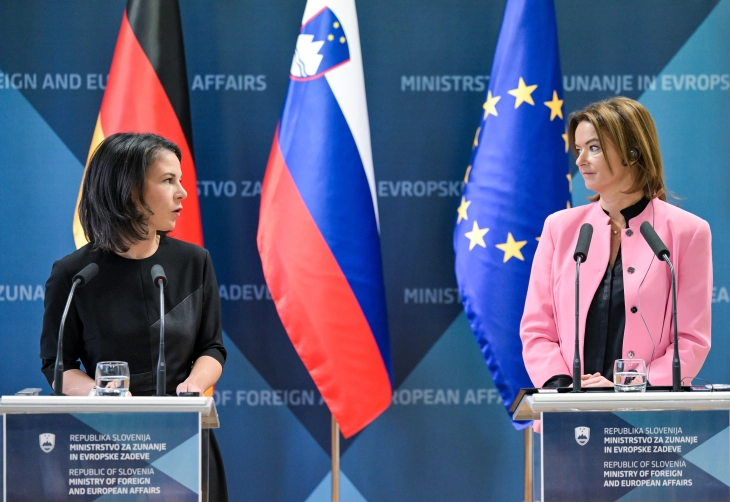Germany, Slovenia back EU membership for Western Balkans
- German Foreign Minister Annalena Baerbock and her Slovenian counterpart, Tanja Fajon, vowed together to support bids by the Western Balkan countries to join the European Union after talks in Ljubljana on Tuesday.

Ljubljana, 5 December 2023 (dpa/MIA) — German Foreign Minister Annalena Baerbock and her Slovenian counterpart, Tanja Fajon, vowed together to support bids by the Western Balkan countries to join the European Union after talks in Ljubljana on Tuesday.
"It is our common goal to promote the accession of the Western Balkan countries to the EU," Baerbock said.
Both politicians emphasized that Russia's invasion of Ukraine had made enlargement of the EU a "geopolitical" necessity.
The Western Balkan countries include Albania, Bosnia-Herzegovina, Kosovo, North Macedonia, Montenegro and Serbia. All six countries are endeavouring to join the EU, but are at different stages in the process.
Slovenia was the first country from the former Yugoslavia to join the EU in 2004. Croatia also joined in 2013.
Baerbock said the German government will be closely watching upcoming Serbian elections on December 17, due to growing nationalist propaganda.
The "lack of equal media access for all political candidates in the past is a particular cause for concern" in Serbia, Baerbock said.
Baerbock also criticized the right-wing populist Hungarian Prime Minister Viktor Orbán's recent blockade of EU accession negotiations with Ukraine.
"However, we as the European Union have also made it clear time and again that we have no time for games at this moment," she said.
Orbán's stance was not a new development. He had repeatedly "blocked support for Ukraine in sanctions packages and in other areas."
In recent weeks, Orbán has repeatedly emphasized that he currently considers EU accession negotiations with Ukraine - which must be unanimously approved by all EU states - to be a mistake.
Baerbock's discussions with Slovenian leaders also addressed the impacts of climate change and devastating floods that hit the country during the summer. Baerbock and Fajon visited Slovenia's national logistics centre for civil protection and disaster control.
At the beginning of August, two thirds of the country was affected by flooding rivers. There were also landslides. The damage was estimated at half a billion euros (about $540 million) at the time. Slovenia is receiving aid from EU funds.







